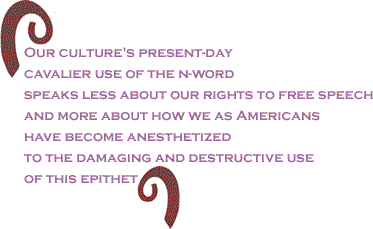
|
|||||||||||||||||||||
 |
|||||||||||||||||||||
 |
|||||||||||||||||||||
 |
|||||||||||||||||||||
 |
|
|
The racist rant heard nationwide by Michael Richards, who played the lovable and goofy character Kramer on the TV sit-com “Seinfeld,” shocked not only his fans and audience that night at the Laugh Factory in West Hollywood, but his racist rant also shocked Americans back to an ugly era in U.S. history. While it is easy to get sidetracked by raising queries about the tenor and intent of Richards repetitive use of the n- word in the context of supposed humor or to vilify Richards for his blatant vile vitriol we must, as Americans, look at the systemic problem of what happens when an epithet like the n-word, that was once hurled at African Americans in this country and banned from polite conversation, now has a broad-base cultural acceptance in our society today. Popularized by young African Americans' use of it in hip-hop music, the bantering and bickering over this word today is no longer about who has been harmed or hurt by its use, but who has the right to use it, which is why Richards was publicly pulverized. Our culture's present-day cavalier use of the n-word speaks less about our rights to free speech and more about how we as Americans - both white and black Americans- have become anesthetized to the damaging and destructive use of this epithet.
However, the notion that it is acceptable for African
Americans to refer to each other using the n-word yet considers
it racist for others outside the race, unquestionably sets up a
double standard. Also the notion that one ethnic group has property But African Americans’ appropriation of the n-word as insiders does neither obliterate the historical baggage fraught with the word nor obliterate its concomitant social relations among blacks, and between whites and blacks as well. And because some African Americans use the term it does not negate also our long history of self-hatred.
The n-word is firmly embedded in the lexicon of racist language that was and still is used to disparage African Americans. However, today the meaning of the N-word is all in how ones spells it. By dropping the “er’ ending and replacing it with either an “a” or "ah” ending, the term morphs into a term of endearment. But many slaveholders pronounced the n-word with the “a" ending, and in the 1920’s many African Americans used the “a ending as a pejorative term to denote class difference among themselves. In 2003, the NAACP convinced Merriam-Webster Lexicographers to change the definition of the word N-word in the dictionary to no longer mean African Americans but instead a racial slur. And while the battle to change the n-word in the American lexicon was a long and arduous one, our culture’s neo-revisionist use of the n-word makes it even harder to purge the sting of the word from the American psyche. Why? Because language is a representation of culture. Language reinscribes and perpetuates ideas and assumptions about race, gender and sexual orientation we consciously and unconsciously articulate in our everyday conversations about ourselves and the rest of the world, and consequently transmit generationally. My enslaved ancestors knew that their liberation was not only rooted in their acts of social protests, but it was also rooted in their use of language, which is why they used the liberation narrative of the Exodus story in the Old Testament as their talking-book. The Exodus story was used to rebuke systemic oppression, racist themes and negative images of themselves. Many activists argue that Richards' repentance should be volunteer work in a predominately African American community anywhere in the county. However, he would find there too that many of us keep the n-word alive. But what would work for him and many in my community is a history lesson because reclaiming racist words like the n-word does not eradicate its historical baggage, and its existing racial relations among us. Instead, it dislodges the word from its historical context and makes us insensitive and arrogant to the historical injustice done to a specific group of Americans. It also allows Americans to become unconscious and numb in the use and abuse of the power and currency this racial epithet still has, currency that thwarts the daily struggle of many of us Americans working hard in trying to ameliorate race relations. The Reverend Monroe is a religion columnist based in Cambridge, MA. She is a Ford Fellow completing her doctorate in the Religion, Gender and Culture Program at Harvard Divinity School. |
|
| Home | |
| November 30, 2006 Issue 208 |
||||||||||||||
|
||||||||||||||
 |
||||||||||||||
|
||||||||||||||
| Printer Friendly Version in resizeable plain text format | ||||||||||||||
 |
||||||||||||||
 |
||||||||||||||
 |
||||||||||||||
 |
||||||||||||||
| |
||||||||||||||
| |
||||||||||||||





























